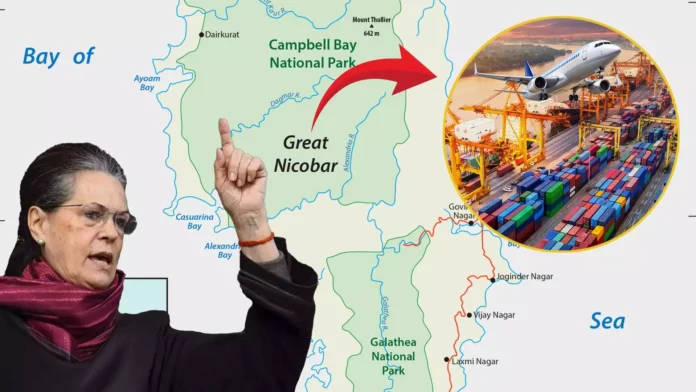Paromita Das
New Delhi, 10th September: In a sharply worded editorial published in The Hindu (September 8, 2025), Congress leader Sonia Gandhi branded the Great Nicobar Project as a “totally misplaced ₹72,000 crore expenditure” that poses an “existential danger” to indigenous communities and “threatens one of the world’s most unique ecosystems.” She accused the Modi government of “trampling tribal rights” and making “a mockery of legal processes.”
At first glance, this sounds like a principled stand on environment and tribal welfare. Yet a deeper look suggests something else: a political playbook that turns development into disaster and frames every ambitious project as betrayal. The truth is far more layered — one that involves ecology, livelihoods, national security, and Bharat’s global standing.
Displacement or Development?
Gandhi claims the Nicobarese and Shompen tribes will be “permanently uprooted.” But project blueprints reveal carefully demarcated zones designed to avoid tribal settlements. Claims of wholesale displacement are therefore overstated.
The irony cannot be overlooked. In 2004, when a tsunami devastated Nicobar, entire tribal villages were destroyed under Congress’s watch. Reconstruction was slow, and modern infrastructure remained elusive. Today, when roads, power, and connectivity are on offer, the same party calls it an “existential threat.” The contradiction is glaring.
"The Great Nicobar Island Project is a grave misadventure, trampling on tribal rights and making a mockery of legal and deliberative processes.
Our collective conscience cannot, and must not, stay silent when the very survival of the Shompen and Nicobarese tribes is at stake.… pic.twitter.com/pjTVX7L7f4
— Congress (@INCIndia) September 8, 2025
Due Process Ignored — or Strengthened?

Another charge is that “due process” was bypassed. Gandhi cites flaws in Social Impact Assessments. Yet the project has undergone scrutiny from the National Green Tribunal, the Environment Ministry’s High Powered Committee, and the National Centre for Sustainable Coastal Management (NCSCM).
Notably, NCSCM’s findings placed the site under CRZ 1B — where ports are permitted — not the ecologically critical CRZ 1A. Far from being a mockery, this layered review reflects adherence to the rulebook.
Afforestation: Sham or Safeguard?

Compensatory afforestation is another flashpoint. Gandhi dismisses it as a “gross catastrophe.” But under the Forest Conservation Act, afforestation is a legally mandated offset with strict oversight. For decades, governments — including Congress-led ones — have relied on this mechanism. To suddenly discredit it suggests selective outrage rather than genuine concern.
The Strategic Silence

Perhaps the most telling omission is strategic. Sonia Gandhi’s critique avoids the fact that nearly 25% of Bharat’s cargo is transshipped via foreign ports — Colombo alone handles 40%, with China controlling a terminal there. Galathea Bay, with natural depths of 18–20 metres and its position on the East-West shipping corridor, offers Bharat a chance to build a world-class transshipment hub.
Ignoring this context is not just shortsighted; it risks leaving Bharat perpetually dependent on facilities with Chinese influence.
Ecology as a Political Bogey

This is not the first time Congress has deployed ecological arguments to stall strategic development. From radar facilities to airstrips, projects in the Andaman and Nicobar Islands have long been blocked on environmental grounds, leaving the region underdeveloped and strategically underutilized. The Nicobar editorial feels like another edition of the same playbook.
Why Galathea Bay Matters

In 2024, the Modi government recognized Galathea Bay as a ‘major port’ under the Ministry of Ports, Shipping, and Waterways, unlocking central funding. Planned in four phases, Phase 1 is set for 2028 with a capacity of 4 million TEUs, expanding to 16 million by 2058.
This is not mere port-building. Most Bharatiya east coast ports have depths of only 8–12 metres, insufficient for mega-vessels. As a result, Bharat loses over ₹1,500 crore annually in port revenue and another ₹3,000–4,500 crore to the wider economy. With Galathea Bay’s natural depth and location, Bharat has an unprecedented chance to reclaim trade routes, rival Singapore, and serve Bangladesh and Myanmar traffic that currently bypasses Bharatiya ports.
Security Beyond Ecology

The project is not only economic but strategic. With China embedded in Sri Lanka’s Colombo port and its surveillance ships docking there, Bharat’s dependence on foreign hubs is a glaring vulnerability. Galathea Bay offers the solution. To oppose it in the name of ecology is to ignore security realities.
The Real Disaster
Sonia Gandhi concludes that tribal survival and ecological protection demand stopping the project. But Bharat cannot afford paralysis. The greater disaster would be to let political alarmism dictate strategic choices.
The Great Nicobar Project represents more than ₹72,000 crore of investment — it is about ending dependency on foreign ports, generating jobs, integrating tribal communities into modern infrastructure, and positioning Bharat as a maritime power. To reduce it to a “mockery of process” or “existential threat” is to miss the larger picture.
The Nicobar debate reflects two visions: one rooted in fear of change, the other in confidence about Bharat’s future. For Congress, ecological concern doubles as political leverage. For Bharat, the stakes are higher — national security, global competitiveness, and maritime independence.
The choice is not between development and ecology, but between stagnation and progress. The Great Nicobar Project, if implemented responsibly, can prove that the two are not opposites but partners in Bharat’s rise.
The post Sonia Gandhi’s Ecological Critique vs Modi’s Maritime Strategy appeared first on Global Governance News- Asia's First Bilingual News portal for Global News and Updates.



